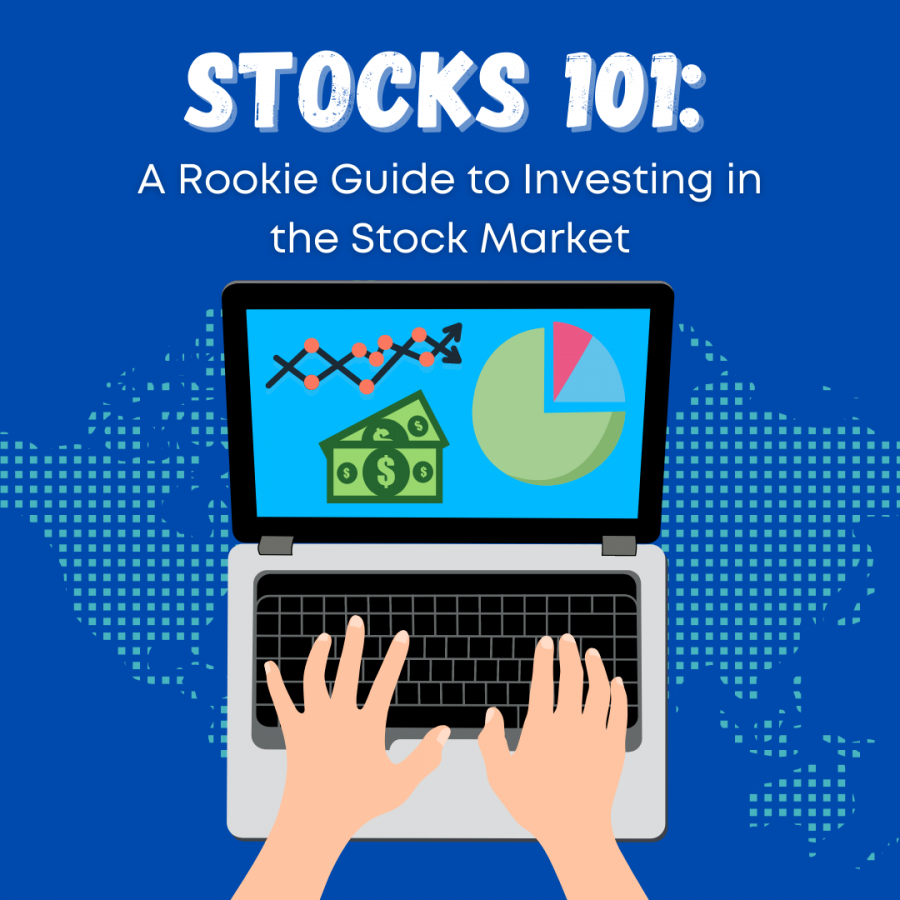Stocks 101: A Rookie Guide to Investing in The Stock Market
December 11, 2021
The U.S. Stock Market, with over 6,000 company listings on the New York Stock Exchange and National Association of Securities Dealers Automated Quotation combined, serves as a way for individuals to purchase a small share of ownership in a company by investment in hopes of earning profit in the future.
Those small shares, known as a company’s stock, are listed on the NYSE and other stock exchanges. By investing in them, investors believe the company will likely grow and perform well over time. If that occurs, the shares — which show a gain in value — would then be sold to other investors for a profit, known as capital gain.
“Stocks represent ownership in a business, and just like any market, it brings together buyers and sellers. If you think a company is selling good products and doing the right thing, you can turn to the stock market and purchase shares of stock, which represents ownership in that company,” Miami Palmetto Senior High School AP Macroeconomics teacher Joel Soldinger said.
Before diving into the complex world of the stock market, it is best to begin by doing research about the stock market or participating in online stock simulations.
“A good [online stock stimulation] is Best Brokers, which is an app that you can download and have on your phone. Basically, it will give you a sense of how the business cycle fluctuates up and down at the price of a stock and lets you see the tickers of what the trading volumes are and what percentage arises day to day,” Palmetto senior and President of Palmetto’s Finance Club Alexandr Kim said.
NASDAQ, one of the most well-known stock exchanges in the U.S., made history as the first electronic exchange. The platform allows investors to trade stocks through a computerized system rather than on a physical trading floor like the NYSE.
In order to access NASDAQ — or any other stock exchange — one must open an intermediary brokerage account, where one can quickly buy and sell stocks, funds and other investments.
Online brokerage accounts are accessible through one’s bank or with apps and websites like Robinhood, Fidelity, TD Ameritrade or other online brokers. Once an order to buy or sell stock(s) is put in place, that order must go through a stock broker, a person with a position on the physical exchange or at a computer that is connected to the exchange system.
“[Investing] would just be a matter of clicking a few buttons on an app or calling your stockbroker, depositing money in your account and having them make the purchase for you,” Soldinger said.
The next step in making an investment is understanding the difference between investing in mutual funds and individual stocks. Equity mutual funds allow for an investor to purchase small pieces of multiple stocks through one transaction. Investing in a fund means that one owns small pieces of each company, which can then be put together to create a diversified portfolio.
Buying a single share of an individual company is one way of dipping one’s toe into the stock-trading waters, as building a larger, more diversified portfolio would require a significant investment.
When investing in individual stocks, it is also important to understand the risk and volatility factors that accompany these investments.
“Volatility is essentially how intensely a stock goes up or how intensely it goes down. If you are trying to make money on a very short timescale, you can take advantage of a stock’s high volatility so you can trade on the high differences between your purchase price and your sell price,” Kim said.
In terms of risk, understanding the difference between penny stocks and blue-chip stocks allows one to be more selective with the kinds of stocks they are investing in. Penny stocks, or any stock valued at any price below $5.00, typically belong to a lesser-known company.
In contrast, blue-chip stocks are the stocks of major companies with large reputations. For example, blue-chip stocks come from companies like Apple ($AAPL), Amazon ($AMZN) and Google ($GOOG), which many consider as “household name” companies. Despite seeming to offer a better investment, blue-chip stocks would not typically be the better option for first-time investors.
“If you are a new investor, it’s especially important to manage your risk and find stocks that work for you, whether it be a blue-chip stock, which is less risky, or a penny stock, which you will probably need to be more open to gambling a little bit,” Palmetto freshman and member of the Finance Club Jack Diemar said.
Moreover, understanding the best time to purchase or sell a stock contributes to one’s success in terms of profit made from each sale.
“For investors who are inexperienced, I would recommend looking at a stock across a one year gap, for example, and seeing something that’s consistent rather than one that will make you a lot of money very quickly,” Kim said.









